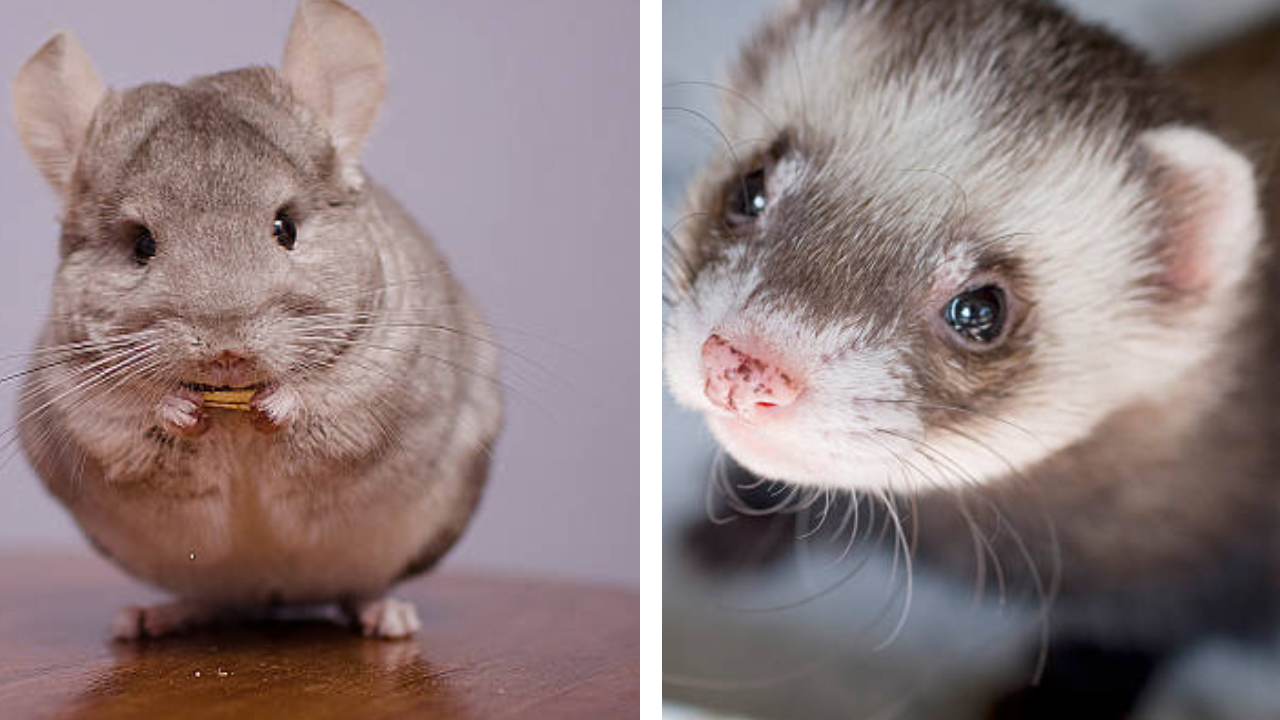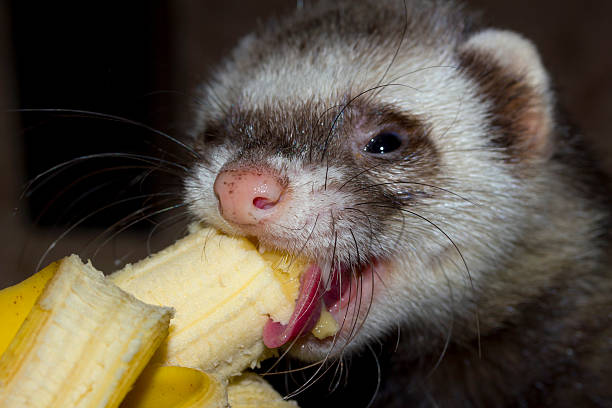Chinchillas and Ferrets – Which One To Choose?
This post contains affiliate links. This means I will make a commission at no extra cost to you should you click through and make a purchase. Read the full disclosure here.
Exotic pets have an undeniable allure, and two creatures that often find themselves in the spotlight of curiosity and fascination are chinchillas and ferrets. These pint-sized companions offer unique charms and distinct personalities, making them popular choices for those looking to venture beyond the realm of traditional pets. But with their endearing qualities come particular needs and considerations. In this blog post, we aim to help you make an informed decision by comparing these two delightful yet distinct animals.
The Popularity of Chinchillas and Ferrets
Chinchillas, known for their velvety soft fur and adorable appearances, have long captured the hearts of pet enthusiasts. These small rodents are native to the Andes Mountains in South America and have gained popularity as pets worldwide due to their appealing features and relatively low maintenance requirements.
On the other hand, ferrets, with their playful antics and mischievous behavior, have also found their way into the homes and hearts of many. These domesticated carnivores have a long history of companionship with humans, serving various roles from hunters of pests to cherished pets.
Chinchillas: The Pros and Cons
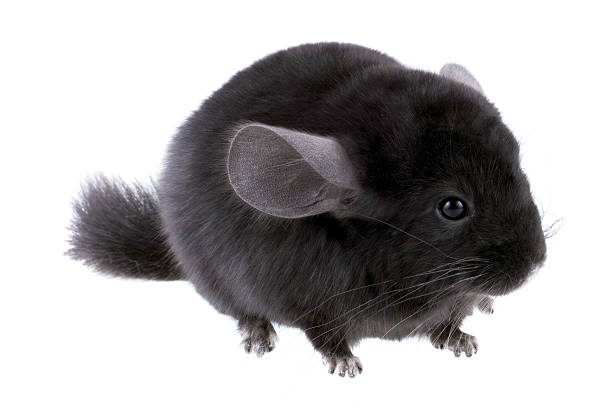
Chinchillas are undeniably captivating creatures with a host of endearing qualities. Before deciding if a chinchilla is the right pet for you, it’s essential to understand both the advantages and disadvantages of chinchilla ownership.
Key Characteristics and Features of Chinchillas
Chinchillas are small, herbivorous rodents known for several distinctive traits:
1. Luxurious Fur:
- Chinchillas possess some of the softest fur in the animal kingdom, making them incredibly appealing to touch.
- Their fur is so dense that it helps protect them from cold temperatures in their native Andean habitat.
2. Nocturnal Nature:
- Chinchillas are primarily nocturnal, meaning they are most active during the night. This can be advantageous for individuals with daytime work schedules.
3. Herbivorous Diet:
- Chinchillas have a diet primarily consisting of hay, supplemented with pellets and fresh vegetables. Their dietary needs are relatively simple compared to some other pets.
Advantages of Owning a Chinchilla
Chinchillas offer several benefits to their owners:
1. Soft and Luxurious Fur:
- The velvety fur of chinchillas is not only a joy to touch but also hypoallergenic, making them a suitable choice for individuals with allergies.
2. Low Maintenance:
- Chinchillas are generally low-maintenance pets in terms of grooming since they regularly clean themselves. They don’t require baths, which is a plus for many pet owners.
3. Quiet and Non-Destructive:
- Chinchillas are known for their quiet demeanor, making them suitable for apartments or homes where noise may be a concern.
- They are less likely to chew on furniture or belongings compared to some other small pets.
Potential Challenges of Owning a Chinchilla
However, chinchillas are not without their challenges:
1. Sensitivity to Heat:
- Chinchillas are highly sensitive to heat and can easily overheat, which makes them better suited for cooler climates or air-conditioned homes.
2. Special Dietary Requirements:
- Their diet consists mainly of hay, which can be less convenient and more expensive than the diets of some other pets.
- Chinchillas can also be prone to dental problems if their teeth don’t wear down properly.
3. Limited Social Interaction:
- While chinchillas can form bonds with their owners, they are generally not as social or interactive as some other pets like dogs or ferrets.
- Daily interaction is essential to build trust and prevent loneliness.
Ferrets: The Pros and Cons

Ferrets are equally charismatic and have their own set of distinctive characteristics that make them endearing pets. As you contemplate whether a ferret is the right choice for you, it’s crucial to explore both the advantages and disadvantages of ferret ownership.
Key Traits and Attributes of Ferrets
Ferrets are domesticated carnivores with a number of defining features:
1. Playful and Energetic Nature:
- Ferrets are renowned for their playful and curious personalities, making them highly entertaining pets.
- Their boundless energy can bring a lot of joy to their owners, as they engage in comical antics and games.
2. Social and Affectionate:
- Ferrets are typically very social animals and often enjoy the company of both their human caregivers and fellow ferrets.
- Their affectionate nature can lead to strong bonds with their owners.
3. Intelligence and Trainability:
- Ferrets are intelligent creatures and can learn tricks and commands, adding an interactive dimension to pet ownership.
- Training can help manage some of their behaviors.
Advantages of Owning a Ferret
Ferrets offer several advantages to those who appreciate their unique qualities:
1. Playful Companionship:
- Ferrets are playful and enjoy games, making them engaging companions for individuals or families looking for active and entertaining pets.
2. Social Interaction:
- Their sociable nature means they thrive on interaction and playtime with their owners, making them ideal for those who can dedicate time to engage with their pets.
3. Intelligence and Training:
- Ferrets can be taught tricks and use litter boxes, enhancing their trainability.
- Their intelligence can make for interesting interactions.
Potential Drawbacks and Responsibilities of Ferret Ownership
However, owning ferrets does come with its own set of responsibilities and challenges:
1. Odor Control and Grooming Needs:
- Ferrets have a distinct musky odor that some individuals find unpleasant. Regular bathing and cleaning of their living environment are essential to manage this odor.
- Grooming is necessary to keep their coats healthy and reduce shedding.
2. Escape Artist Tendencies:
- Ferrets are notorious escape artists and can slip through small openings. Securing their living space is crucial to prevent them from getting into potentially dangerous situations.
3. Legal Restrictions in Some Areas:
- It’s important to check local laws and regulations regarding ferret ownership, as they are illegal in some places due to concerns about their impact on local ecosystems.
Understanding the pros and cons of chinchillas and ferrets is essential for making an informed decision about which pet aligns best with your lifestyle and preferences.
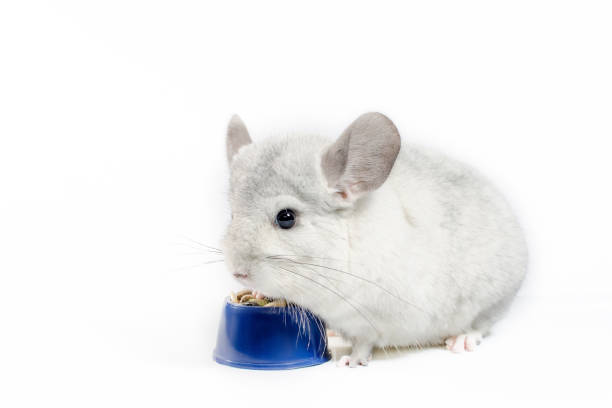
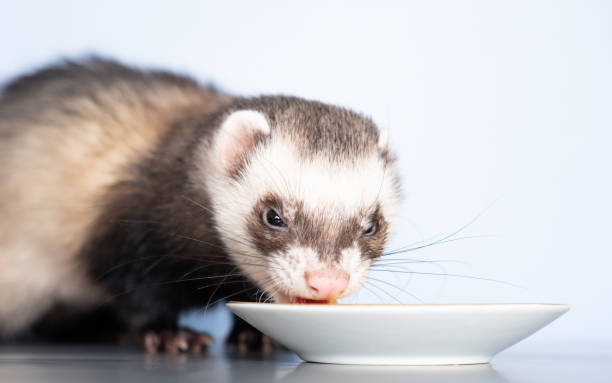
Lifestyle Considerations
Selecting the right pet goes beyond mere affection for their adorable appearances; it should harmonize with your lifestyle and living conditions. Here, we’ll explore how chinchillas and ferrets align with different lifestyles, helping you better understand which might be the ideal fit for you.
Assessing Your Lifestyle and Living Conditions
Before welcoming any pet into your life, consider the following factors:
1. Space Availability:
- Do you live in a spacious house or a compact apartment? The amount of space you have can influence your choice.
- Chinchillas typically require less space and can thrive in a smaller living environment compared to ferrets.
2. Time Commitment:
- How much time can you dedicate to your pet each day? Some pets require more interaction and care than others.
- Ferrets are highly social and require more daily interaction and playtime than chinchillas, which are more independent.
Chinchillas: Ideal for Quieter Environments and Less Time
Chinchillas can be a great choice for individuals with certain lifestyles:
1. Quiet Environments:
- If you live in an apartment or a setting where noise is a concern, chinchillas’ quiet nature makes them an attractive option.
2. Limited Time Availability:
- Chinchillas are relatively low-maintenance and can adapt well to a daily routine with less direct interaction.
3. Smaller Living Spaces:
- Their compact size means they don’t need as much space to roam, making them suitable for cozier homes.
Ferrets: Suited for Active Households with More Interaction Time
Ferrets, with their energetic personalities, thrive in particular living situations:
1. Active Households:
- If your household is lively and you have the time and energy for active play, ferrets can be a delightful addition to your home.
2. Social Interaction:
- Ferrets are highly social and require daily playtime and engagement with their owners to stay happy and healthy.
3. More Space:
- Due to their activity level, ferrets benefit from larger living spaces where they can explore and play.
Understanding how chinchillas and ferrets fit into various lifestyles is a crucial step in making the right choice.
Health and Care
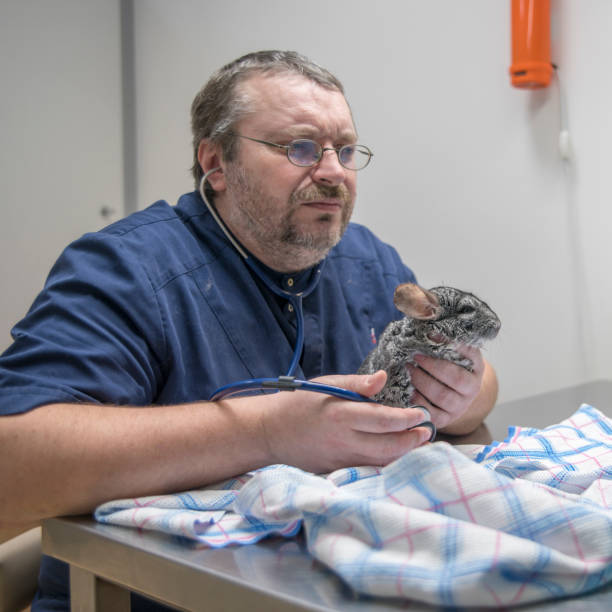
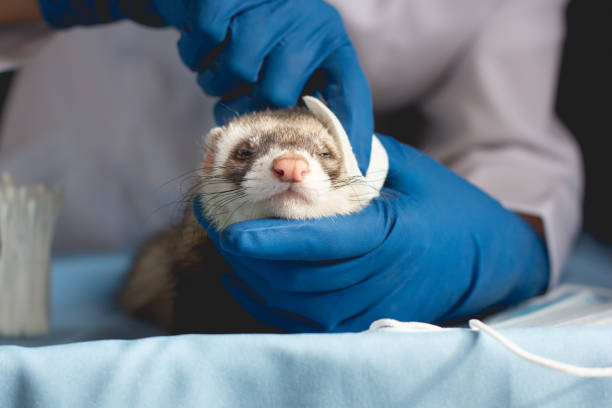
Owning any pet comes with a responsibility to ensure their health and well-being. Both chinchillas and ferrets have unique care requirements that you should be aware of before making a decision. In this section, we’ll explore the general health and care needs of these pets.
General Health and Care Requirements
Chinchillas:
- Diet: Chinchillas primarily eat hay, which is essential for their dental health. They also require a small amount of chinchilla-specific pellets and fresh vegetables. Proper nutrition is crucial to prevent obesity and dental issues.
- Habitat: Chinchillas need a secure and well-ventilated cage with shelves and platforms for exercise. Avoid wire-bottom cages to prevent foot injuries.
- Grooming: While chinchillas clean themselves, they may require dust baths to maintain their fur’s cleanliness and health.
- Social Interaction: Chinchillas can become lonely and stressed if left alone for extended periods. Daily interaction and playtime are essential for their mental well-being.
Ferrets:
- Diet: Ferrets are obligate carnivores, requiring a diet high in animal protein. Specialized ferret food or high-quality cat food is recommended.
- Habitat: Ferrets need a spacious and secure enclosure with multiple levels for play. They are prone to digging, so a litter box is essential.
- Grooming: Ferrets shed seasonally and require regular grooming to reduce shedding and prevent hairballs. Bathing should be done only when necessary to avoid skin issues.
- Social Interaction: Ferrets are highly social and thrive on human interaction and play with other ferrets. They can become depressed if left alone for extended periods.
Specific Health Issues and Concerns
Chinchillas:
- Dental Problems: Chinchillas have continuously growing teeth that can develop dental issues if not properly worn down through chewing hay and toys.
- Heat Sensitivity: Chinchillas are sensitive to high temperatures and must be kept in a cool, well-ventilated environment.
- Respiratory Issues: They are susceptible to respiratory infections, so a clean living environment is crucial.
Ferrets:
- Adrenal Gland Disease: Ferrets are prone to adrenal gland disease, which may require surgery or medication.
- Insulinoma: This is a common pancreatic disease in ferrets that can be managed with dietary changes and medications.
- Lymphoma: Ferrets have a high risk of developing lymphoma, a type of cancer.
Regular vet visits are essential for both chinchillas and ferrets to monitor their health and address any potential issues. Additionally, educating yourself about their specific needs and providing appropriate care is vital to ensure a long and healthy life for your chosen pet.
Legal Considerations

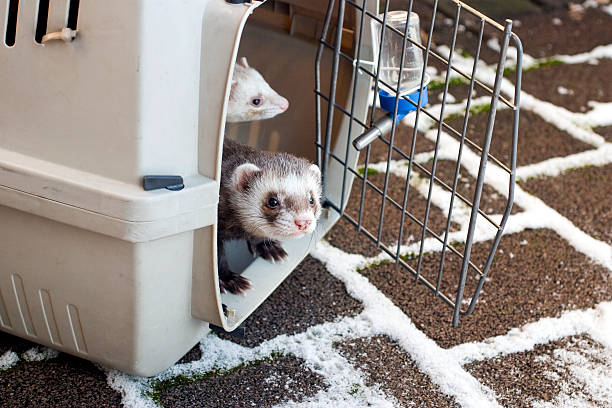
Before you bring a chinchilla or a ferret into your home, it’s crucial to be aware of any legal restrictions or regulations that may apply to these pets. Laws regarding exotic pet ownership can vary significantly by location and even change over time. Therefore, it’s essential to check and comply with the local regulations in your area. Here’s what you need to know:
Chinchillas:
Chinchillas are generally legal to own as pets in many places, including the United States and most European countries. However, there might be specific regulations at the state or local level, so it’s essential to:
- Check Local Laws: Research and contact your local animal control or government agencies to verify if there are any restrictions on owning chinchillas in your area.
- Permits: In some cases, permits or licenses may be required for keeping chinchillas, especially if you plan to breed them.
- CITES: If you’re considering obtaining a wild-caught chinchilla or traveling internationally with a pet chinchilla, you may need to navigate regulations set by the Convention on International Trade in Endangered Species of Wild Fauna and Flora (CITES).
Ferrets:
Ferret ownership regulations are more varied and can be more restrictive:
- State and Local Laws: Some states and local municipalities in the United States have specific laws regarding ferret ownership. Some may outright ban them, while others may require permits.
- European Union: In the EU, ferret ownership regulations vary by country. Some countries allow ferrets as pets with certain conditions, while others may prohibit them.
- Australia and New Zealand: Both Australia and New Zealand have strict bans on ferret ownership due to concerns about their potential impact on local ecosystems.
Before bringing a ferret into your home, it’s imperative to research and confirm the legal requirements in your area. Failing to comply with local laws can result in legal consequences and the removal of your pet.
Cost of Ownership

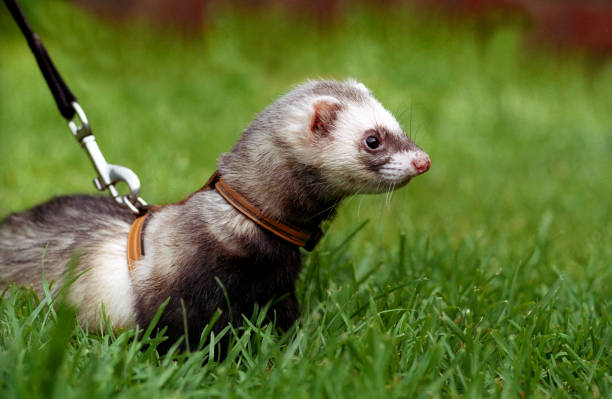
Choosing a pet involves not only emotional but also financial considerations. The cost of owning a chinchilla or a ferret goes beyond the initial adoption or purchase price. In this section, we’ll break down the estimated costs associated with these charming pets, helping you plan your budget effectively.
Initial Setup and Adoption Fees
Chinchillas:
- Adoption or Purchase: The cost of acquiring a chinchilla can vary depending on factors like breed and age. On average, you can expect to pay between $100 and $300 for a chinchilla.
- Cage: Chinchillas require a spacious, multi-level cage with adequate ventilation. A suitable cage can cost anywhere from $100 to $300 or more.
- Accessories: You’ll need to invest in items like food bowls, water bottles, hideaways, and exercise wheels, which can collectively cost around $50 to $100.
Ferrets:
- Adoption or Purchase: Ferrets are often pricier than chinchillas, with costs ranging from $100 to $300 per ferret.
- Cage: Ferrets need a larger, more elaborate cage compared to chinchillas. A suitable ferret cage can cost between $150 and $500.
- Accessories: Ferrets require bedding, hammocks, litter boxes, and toys. These accessories can cost around $75 to $150 initially.
Ongoing Expenses
Chinchillas:
- Food: High-quality chinchilla pellets and hay are ongoing expenses, amounting to approximately $15 to $30 per month.
- Bedding and Litter: Bedding and litter for the cage will cost around $10 to $20 per month.
- Veterinary Care: Regular check-ups and potential health issues may require veterinary expenses, which can vary widely.
Ferrets:
- Food: Ferrets require a diet high in animal protein. Specialized ferret food or high-quality cat food costs approximately $20 to $40 per month.
- Bedding and Litter: Bedding and litter expenses for ferrets are similar to chinchillas, averaging around $10 to $20 per month.
- Veterinary Care: Ferrets may have higher veterinary costs due to their susceptibility to certain health issues.
- Grooming: Grooming supplies, like shampoos and brushes, may be needed periodically.
It’s essential to consider these costs when deciding between a chinchilla and a ferret. Remember that the cost of ownership is ongoing, and you should be prepared for potential unexpected veterinary expenses. Budgeting for your pet’s needs ensures their well-being and prevents financial strain.
Conclusion
Choosing between a chinchilla and a ferret as your next pet is a decision that should be made carefully, taking into account your lifestyle, preferences, and the unique characteristics of these charming animals.
Ultimately, the choice between a chinchilla and a ferret depends on your individual circumstances and preferences. Consider your living space, daily routine, and budget when making this important decision. Remember that owning a pet is a long-term commitment that should be made with careful consideration of both the pet’s needs and your ability to meet them.
I hope this blog post has provided you with valuable insights to help you choose between these captivating animals.

